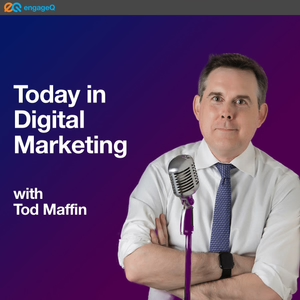
Two Genesis Creditors Describe Their Frustrations With the Bankrupt Crypto Lender - Ep. 565
11/04/23 • 88 min
1 Listener
Two Genesis creditors, BJ and Branden, who prefer to use pseudonyms for security reasons, spoke with Unchained about the alleged fraud by the crypto lender and its parent company, Digital Currency Group (DCG). The discussion is one of the first times Genesis creditors have spoken with a media organization about the situation.
BJ and Branden explain how they gave more loans to Genesis after it took a $1.1 billion hit from the liquidation of Three Arrows Capital and how they then came to be members of the ad hoc group, a collective of Genesis customers who came together to try and save the company from bankruptcy.
They talk about how they now want DCG to pay back the $1.1 billion it owes over a shorter timeframe and to pay back any Bitcoin in actual Bitcoin. The discussion with Unchained followed shortly after New York Attorney General Letitia James filed a lawsuit against Genesis, along with its parent company Digital Currency Group, and Gemini Trust.
Listen to the episode on Apple Podcasts, Spotify, Overcast, Podcast Addict, Pocket Casts, Stitcher, Castbox, Google Podcasts, Amazon Music, or on your favorite podcast platform.
Show highlights:
- what NYAG Letitia James alleged in the lawsuit against Gemini, DCG, and Genesis
- how BJ and Branden became creditors of Genesis, including the role of the influence of MicroStrategy's Michael Saylor
- how Genesis claimed it got into what it called a “liquidity mismatch”
- how, after the Three Arrows Capital collapse, BJ and Branden were reassured that Genesis had "no issues" and "was back to business"
- whether the trading and lending units of Genesis were all part of the same company and why that distinction is important
- what the difference is between the ad hoc group and an unsecured creditors committee
- what the creditors are proposing in order to get their assets back
- why the creditors want to be paid in crypto, not in USD
- whether the case will go to litigation and what Silbert can do to avoid it
Thank you to our sponsors!
Guests:
- Branden, Creditor of Genesis
- BJ, Creditor of Genesis
Links
Previous coverage of Unchained on Genesis and DCG:
- Genesis May Be Facing Bankruptcy. Could It Take DCG Down With It?
- Gemini vs. DCG Is Heating Up. Could Gemini Force Genesis Into Bankruptcy?
- $630M Due Next Week: Is DCG at Default Risk?
NYAG Lawsuit
- Unchained: NY Attorney General Sues Crypto Firms Gemini, Genesis, and DCG for Over $1 Billion Fraud
- The Block: DCG says it was 'blind sided' by NYAG suit in third quarter shareholder letter
Genesis, Gemini, DCG disputes
Two Genesis creditors, BJ and Branden, who prefer to use pseudonyms for security reasons, spoke with Unchained about the alleged fraud by the crypto lender and its parent company, Digital Currency Group (DCG). The discussion is one of the first times Genesis creditors have spoken with a media organization about the situation.
BJ and Branden explain how they gave more loans to Genesis after it took a $1.1 billion hit from the liquidation of Three Arrows Capital and how they then came to be members of the ad hoc group, a collective of Genesis customers who came together to try and save the company from bankruptcy.
They talk about how they now want DCG to pay back the $1.1 billion it owes over a shorter timeframe and to pay back any Bitcoin in actual Bitcoin. The discussion with Unchained followed shortly after New York Attorney General Letitia James filed a lawsuit against Genesis, along with its parent company Digital Currency Group, and Gemini Trust.
Listen to the episode on Apple Podcasts, Spotify, Overcast, Podcast Addict, Pocket Casts, Stitcher, Castbox, Google Podcasts, Amazon Music, or on your favorite podcast platform.
Show highlights:
- what NYAG Letitia James alleged in the lawsuit against Gemini, DCG, and Genesis
- how BJ and Branden became creditors of Genesis, including the role of the influence of MicroStrategy's Michael Saylor
- how Genesis claimed it got into what it called a “liquidity mismatch”
- how, after the Three Arrows Capital collapse, BJ and Branden were reassured that Genesis had "no issues" and "was back to business"
- whether the trading and lending units of Genesis were all part of the same company and why that distinction is important
- what the difference is between the ad hoc group and an unsecured creditors committee
- what the creditors are proposing in order to get their assets back
- why the creditors want to be paid in crypto, not in USD
- whether the case will go to litigation and what Silbert can do to avoid it
Thank you to our sponsors!
Guests:
- Branden, Creditor of Genesis
- BJ, Creditor of Genesis
Links
Previous coverage of Unchained on Genesis and DCG:
- Genesis May Be Facing Bankruptcy. Could It Take DCG Down With It?
- Gemini vs. DCG Is Heating Up. Could Gemini Force Genesis Into Bankruptcy?
- $630M Due Next Week: Is DCG at Default Risk?
NYAG Lawsuit
- Unchained: NY Attorney General Sues Crypto Firms Gemini, Genesis, and DCG for Over $1 Billion Fraud
- The Block: DCG says it was 'blind sided' by NYAG suit in third quarter shareholder letter
Genesis, Gemini, DCG disputes
Previous Episode

SBF Trial, Day 18: Sam Bankman-Fried Found Guilty on All 7 Counts in Swift Verdict
The downfall of former FTX CEO Sam Bankman-Fried from king of the crypto world to crypto scammer is complete.
A Manhattan jury of nine women and three men took less than five hours Thursday afternoon, day 18 of the high-profile trial, to convict Bankman-Fried on seven counts of fraud and conspiracy for stealing billions of dollars of his customers’ assets.
“Sam Bankman-Fried perpetrated one of the biggest financial frauds in American history, a multi-million scheme designed to make him the king of crypto,” said Damian Williams, U.S. attorney for the Southern District of New York in remarks following the verdict.
The guilty verdict came a year to the day after crypto publication CoinDesk published a story showing balance sheet irregularities at Bankman-Fried’s investment company, Alameda Research, that suggested the ties between Alameda and FTX were unusually close. Bankman-Fried now faces potentially decades in prison. Sentencing is scheduled for March 28.
After listening to Judge Lewis Kaplan read through 60 pages of instructions, jurors quickly concluded that Bankman-Fried was responsible for decisions that led to an $8 billion hole in its balance sheet, including the use of customer assets for political donations, investments and his own personal use. Prosecutors had reiterated this theme in a stinging, Thursday morning rebuttal.
And jurors rejected whole-hog Bankman-Fried’s defense team’s narrative that Bankman-Fried was being villainized for being a poor manager who didn’t create sufficient risk management systems. They also did not buy into Bankman-Fried’s claim that he was unaware of the severity of his company’s financial problems and that his inner circle, three of whom testified earlier in the trial as part of plea agreements, were to blame.
“We respect the jury’s decision,” said Bankman-Fried’s lead attorney, Mark Cohen. But we are very disappointed with the result. Mr. Bankman-Fried maintains his innocence and will continue to fight the charges against him.”
U.S. attorney Wiliams called Bankman-Fried’s crimes “ fraud” as “old as time,” and said his office had “no patience for it.”
He added: “This case moved at lightning speed, that was a choice, not a coincidence.”
Catch up on Unchained’s previous coverage:
- SBF Trial, Day 1: Possible Witnesses Include FTX Insiders, Big Names in Crypto, and SBF’s Family
- SBF Trial, Day 2: DOJ Says Sam Bankman-Fried ‘Lied’ While Defense Claims His Actions Were ‘Reasonable’
- SBF Trial, Day 3: Why a True Believer in FTX Flipped Once He Learned One Fact
- SBF Trial, Day 4: SBF’s Lawyers Annoy Judge Kaplan, While Wang Reveals Alameda’s Special Privileges
- SBF Trial, Day 5: SBF's Defense Finally Found Its Legs, But Can It Counter Caroline Ellison?
- SBF Trial, Day 6: Caroline Ellison Recalls 'The Worst Week of My Life'
- SBF Trial, Day 7: In SBF Trial, Did the Defense Lose Its Opportunity With the Star Witness?
- SBF Trial, Day 8: Former BlockFi CEO Adds Credibility to Fraud Charges
- SBF Trial, Day 9: Nishad Singh Describes Former FTX CEO as a Bully and Big Spender
- SBF Trial, Day 10: Defense Struggles to Discredit Nishad Singh's Testimony
- SBF Trial, Day 11: How Alameda Got FTX Into a $9 Billion Hole
- SBF Trial, Day 12: Former FTX General Counsel Spe...
Next Episode

A 20+ Year Sentence? Why the Evidence Against SBF Was Too Hard to Overcome - Ep. 566
In this episode of Unchained, Laura does a detailed unpacking of the historic Sam Bankman-Fried trial and verdict with defense lawyer Sam Enzer and former Southern District of New York prosecutor Rich Cooper. They discuss what a thorough job the government did in presenting its case, whether the government will pursue a second trial on campaign finance charges, why it takes so long for sentencing to occur, what the differences between this case and the Bernie Madoff case are, and what Bankman-Fried’s likely sentence will be.
Listen to the episode on Apple Podcasts, Spotify, Overcast, Podcast Addict, Pocket Casts, Stitcher, Castbox, Google Podcasts, Amazon Music, or on your favorite podcast platform.
Show highlights:
- how the cross-examination of SBF showed to the jury that he was unreliable, according to Rich
- why the charge conference with the jury is important to the prosecution for “protecting the record”
- why the closing argument of the prosecutors was so effective
- what “conscious avoidance” is and how the prosecutors tried to prove that SBF was guilty of that
- why SBF’s tweet last November that "FTX is fine" was the hardest part of the trial for the defense, according to Enzer
- why Enzer wasn’t surprised by how quickly the jury made its decision
- what SBF’s strongest argument is for an appeal
- why Enzer "hopes" that there won't be a second trial against SBF and whether he will plead guilty to the additional charges
- why the sentencing occurs so many months after the verdict
- how this case is similar, but also different, from the Bernie Madoff case
- how many years SBF could spend in prison, according to Enzer and Cooper
- when cooperating witnesses such as Caroline Ellison, Nishad Singh, and Gary Wang are likely to get sentenced
Thank you to our sponsors!
Guest:
- Sam Enzer, partner at Cahill Gordon & Reindel.
- Previous appearances on Unchained:
- Why SBF's Testimony So Far Has Likely Already Doomed Him
- Another Bad Week for Sam Bankman-Fried in His Criminal Trial
- Why These Lawyers Say It's Over for SBF-But His Only Hail Mary Is to Testify
- SBF Trial: How Sam Bankman-Fried’s Lawyers Might Try and Win His Case
- SBF’s Lawyers Could Be Annoying the Judge. How Might That Impact the Trial?
- Rich Cooper, Former SDNY prosecutor
Links
- Previous coverage by Unchained on the trial of Sam Bankman-Fried:
- How Heated Sidebars During the SBF Trial Could Impact the Jury’s Decision
- SBF Trial, Day 1: Possible Witnesses Include FTX Insiders, Big Names in Crypto, and SBF’s Fam...
If you like this episode you’ll love
Episode Comments
Generate a badge
Get a badge for your website that links back to this episode
<a href="https://goodpods.com/podcasts/unchained-157819/two-genesis-creditors-describe-their-frustrations-with-the-bankrupt-cr-36064623"> <img src="https://storage.googleapis.com/goodpods-images-bucket/badges/generic-badge-1.svg" alt="listen to two genesis creditors describe their frustrations with the bankrupt crypto lender - ep. 565 on goodpods" style="width: 225px" /> </a>
Copy




